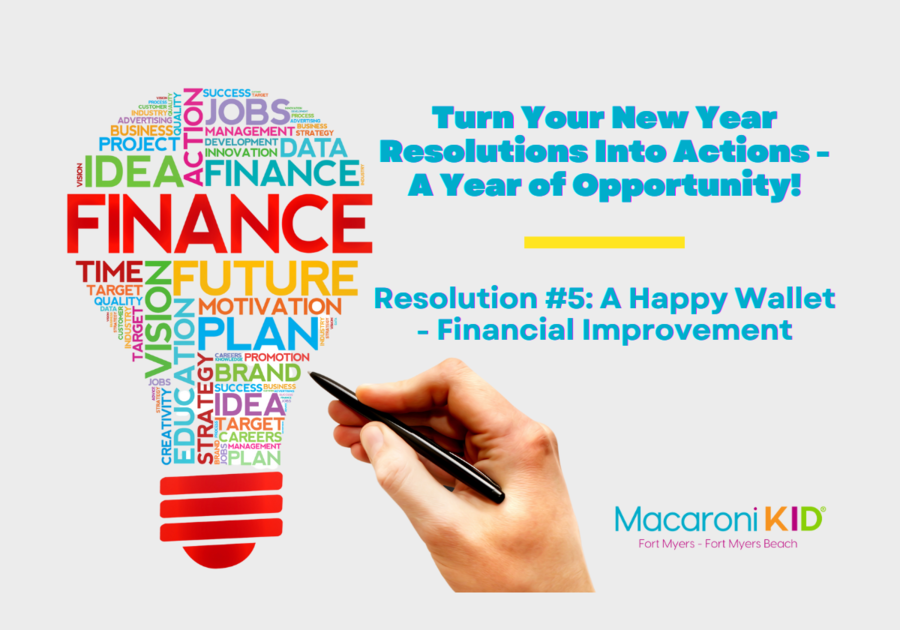Now is as good a time as any to start on the path to financial stability, and that starts with financial improvement. We've compiled a few tips to help you on your financial improvement journey.
*Always consult with a financial advisor for advice based on your specific situation*
3-Month Emergency Fund
One thing that all experts agree on, is that you should have a 3-month emergency fund readily available. We learned about this the hard way with Hurricane Ian making a "wrong turn" and leaving us all in a difficulty predicament. An emergency fund is money that you've set aside for a rainy day. Well, not literally a rainy day ... You should try to reserve this fund for true emergencies.
What is a true emergency?
- Medical or dental emergencies
- Job loss/layoff
- Car accidents and engine troubles
- Natural disasters
- Unplanned emergency travel expenses
- Emergency home repairs
How much should you save up in the emergency fund?
Experts suggest starting with $1,000, if you have consumer debt. Once you've gotten out of debt, saving up 3-6 months worth of expenses is ideal. Having more savings is better if you are on a single income, don't have a steady job, earn only commission, have a family member with continual medical needs, there is a recession, you're retiring, etc.
You'll want to consider all of your required monthly living expenses, not entertainment or non-essential expenses:
- Food
- Housing & utilities
- Medical and medicines
- Transportation costs and car insurance
- Debt and credit card payments
Where should you keep your emergency fund?
It should be kept somewhere that is easily and quickly accessible to you, like a savings account connected to your checking account or any other account that allows for debit card usage and check writing. You don't want to have your emergency funds stuck in your 401k, for example, which would result in hefty early withdrawal taxes and long processing times.
What are easy ways to start your emergency fund?
- Have a garage sale, sell items on Poshmark, or Facebook Marketplace (using caution!)
- Spend less. If you frequently dine at restaurants, spend a lot on name-brand clothing, purchase Starbucks coffee every day, then you're probably throwing away hundreds each month.
- Use this 14 Day Money Finder to help find ways you can save in your budget.
- Add to your income. Get a part-time job if time allows, do gig work (babysitting, Instacart Delivery Driver, mowing your neighbor's lawn, etc).
- Adjust your tax withholdings. Your tax refund is money that you earned and are letting the government hold as an interest-free loan. Instead of getting a lump sum at the end of the year, don't allow them to take so much from your paychecks each week. Use this additional amount you receive to put away in your emergency fund.
How can I start saving for an emergency fund? Create a budget and stick to it! If you allow yourself to grab a few extra coffees from Starbucks for the month, you'll find it easier to overspend and exceed that budget, which you don't want.
Budget
Here is Macaroni KID Custom Family Budget Worksheet. Subscribers can find the spreadsheet located within our Printables folder, via the Printables Link on every newsletter.
If you prefer to create your own budgeting plan, here are some items that you should remember to include:
- Housing Costs - maximum of 35% of your budget - this includes rent/mortgage, HOA fees, taxes, and home maintenance costs
- Utilities - about 5-10% of your budget - this includes electric, gas, sewer/water, HVAC maintenance, irrigation, phone bill, internet/tv services
- Car & Transportation Costs - about 10-15% of your budget - this includes car payments, registration and fees, gas, maintenance, parking fees, tolls, Uber/Lyft fares and/or public transit costs
- Food - about 10-15% of your budget - include both grocery shopping and dining out or delivery
- Insurance - 10-25% of your budget - include health, homeowners, renters, auto, life, disability and/or pet insurance
- Medical - about 5-10% of your budget - this includes out of pocket medical costs, specialty care, medications, vitamins, supplements, dental care, urgent care, and durable medical equipment
- Savings & Debt Reduction - about 10-20% of your budget - this can help you build your emergency fund, payoff consumer debts, and invest for the future
- Discretionary Income & Expenses - if you still have leftover income after all of the necessary expenses above, you can budget for non-essential items, such as: clothing, gifts, home décor, vacations, events, entertainment, etc.
Retirement Plan
You should start saving money and continue through about age 49. Between ages 50 - 61, you're preparing for retirement, and should still be saving. Then, sometime after age 62, you'll retire from the workforce, which is when you'll need your income from your retirement fund and social security payments. Vanguard has lots of retirement planning tools and calculators for you to get a better look at your financial future. Here is a list created by the IRS, which lists the different types of retirement plans.
Social Security
On every paycheck you receive, you see taxes being withdrawn, but you also see social security withdrawals. Social security may become your main, if not only, source of income after retirement. You can receive Social Security as early as age 62. 67 is considered the full retirement age for anyone born after January 1, 1960.
Free Annual Credit Report
Did you know that you are entitled to a free copy of your credit reports, annually? Did you also know that there are three different credit bureaus that each have a different copy of your credit report?
What is a credit report?
A credit report contains your personal information and credit history. They help banks, credit card companies, loan companies, employers, and others determine your credit worthiness for their product or service. They can affect your purchase power, your chances of getting a particular job, renting or buying a home, deciding whether or not to loan you money or give you credit, and more.
Why are there three credit bureaus and who are they?
Not all creditors report to the credit bureaus, and if they do, they may only report to one or two of them.
- Equifax: 1-800-685-1111; Equifax.com/personal/credit-report-services
- Experian: 1-888-397-3742; Experian.com/help
- TransUnion: 1-888-909-8872; TransUnion.com/credit-help
How can I order a copy of each credit report, for free?
- Visit AnnualCreditReport.com to order all three at once *Note: this is the ONLY WEBSITE AUTHORIZED to complete free annual credit report requests*
- You will get immediate access to your reports
- Call 1-877-322-8228, verify your information, and order via phone
- Processing and mailing times can take up to 15 days from request date
- Complete the Annual Credit Report Request Form and mail it to:
Annual Credit Report Request Service
P.O. Box 105281
Atlanta, GA 30348-5281- Processing and mailing times can take up to 15 days from date of receipt of request
- You can request up to six (6) free additional credit reports per year from Equifax through 2026 from the above website
- If you'd like your reports in Braille, large print, or audio formats, you can expect it to take about three weeks to receive
- If you've already used your free credit report, you have the option to purchase additional reports from the credit bureaus, directly
Why should I check my credit reports regularly?
Since so much rides on your credit report history and credit score, you'll want to ensure there are no mistakes, no fraud or identity theft, and nothing out of the ordinary. You may find a collection or negative item that you didn't know about, or forgot about. You'll also be able to use your credit reports to organize a plan to pay off debts.
What if the information is incorrect?
You can and should dispute the data on the credit reports, if you notice any inaccuracies.
Who can retrieve my credit report?
Only you can have access to your credit report. You must agree, in writing, for an employer, landlord, loan company, credit card company, etc to get a copy.
Other Financial Tips & Resources
- Keep up with home maintenance to prevent costly repairs
- Try to pay down larger debts before smaller debts
- Hire a financial advisor
- Ask your HR department for clarification on your taxes and withdrawals
- Create and stick to your budget
- There is such thing as lifestyle inflation, which occurs when your income and spending increase simultaneously
Looking for more in our Series: Turn Your New Year Resolutions Into Actions - A Year of Opportunity? Check out the other ideas for getting 2024 off to a glorious start!



